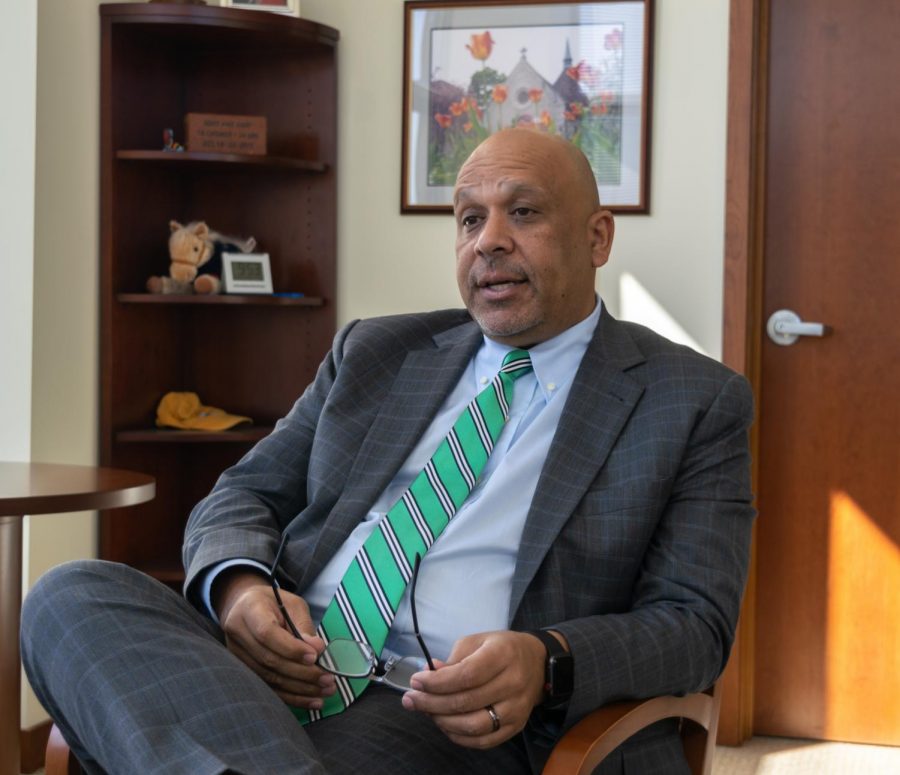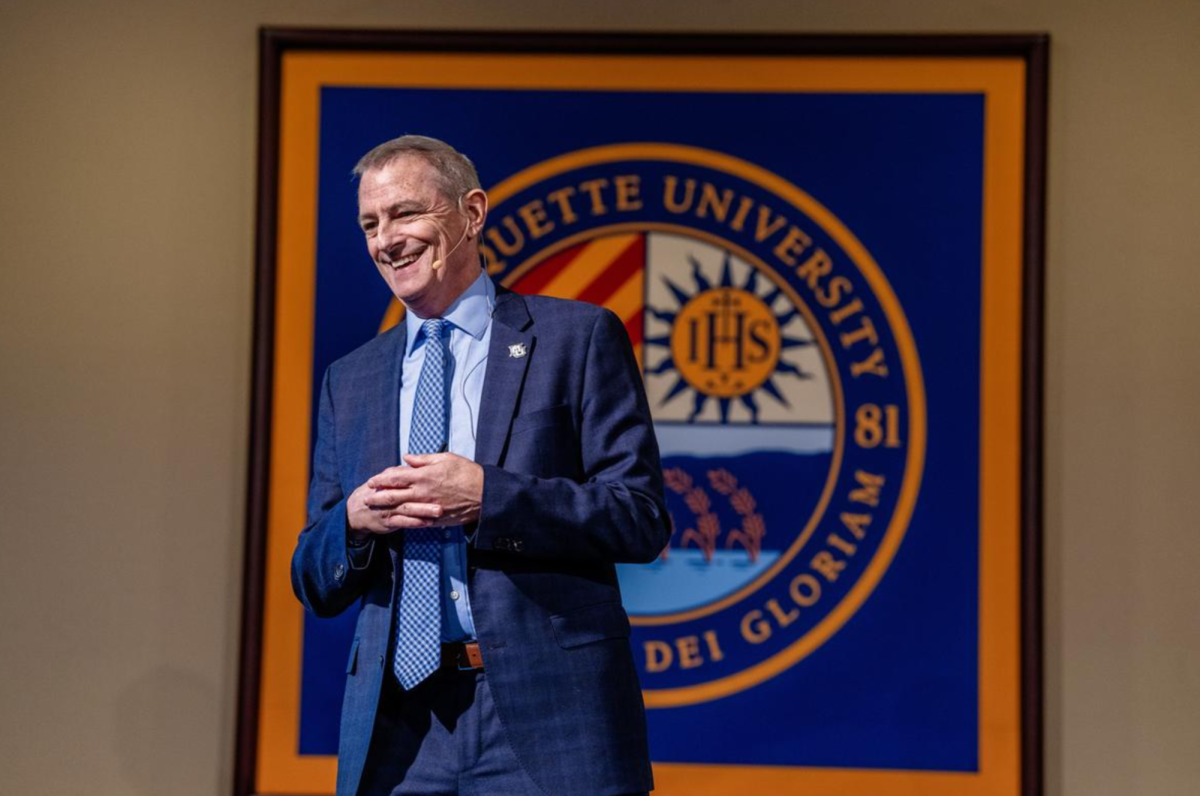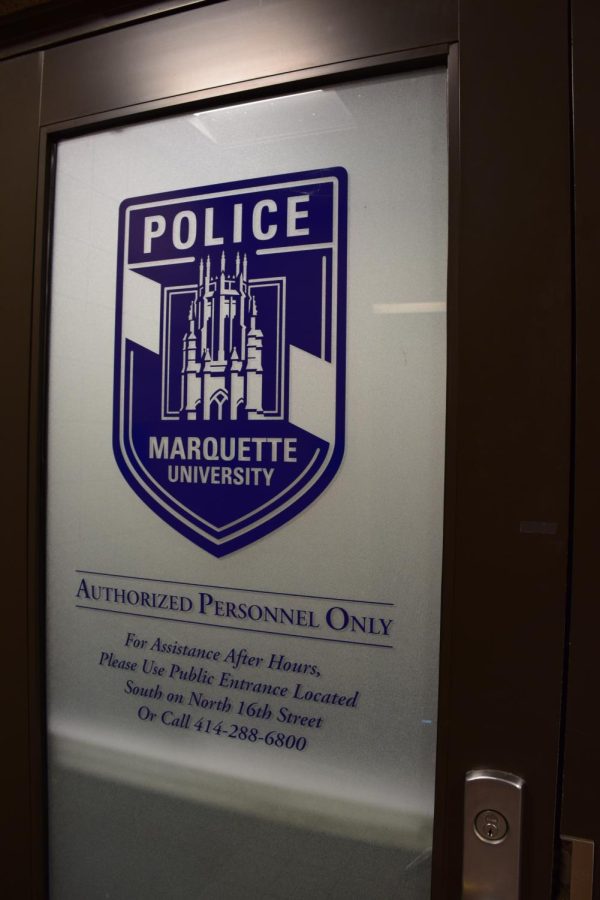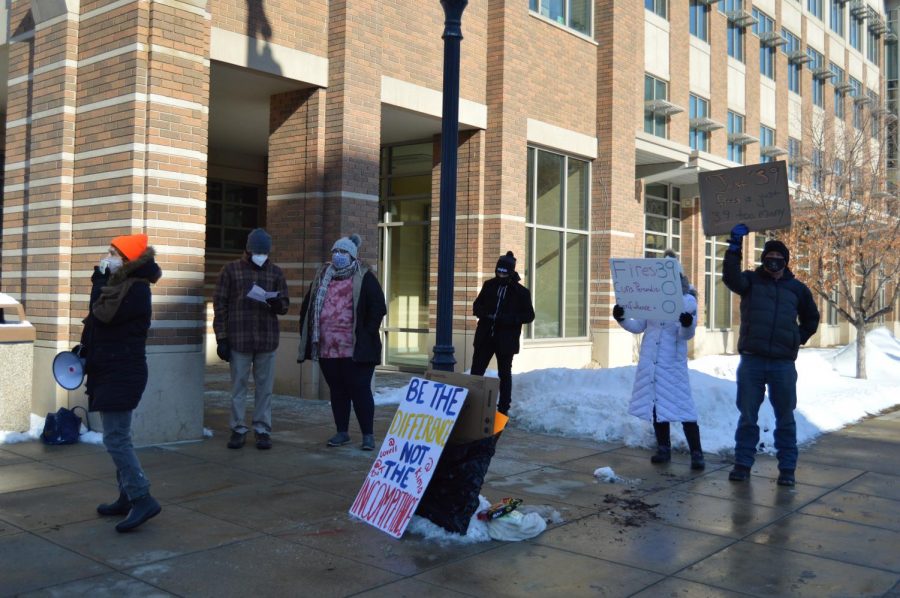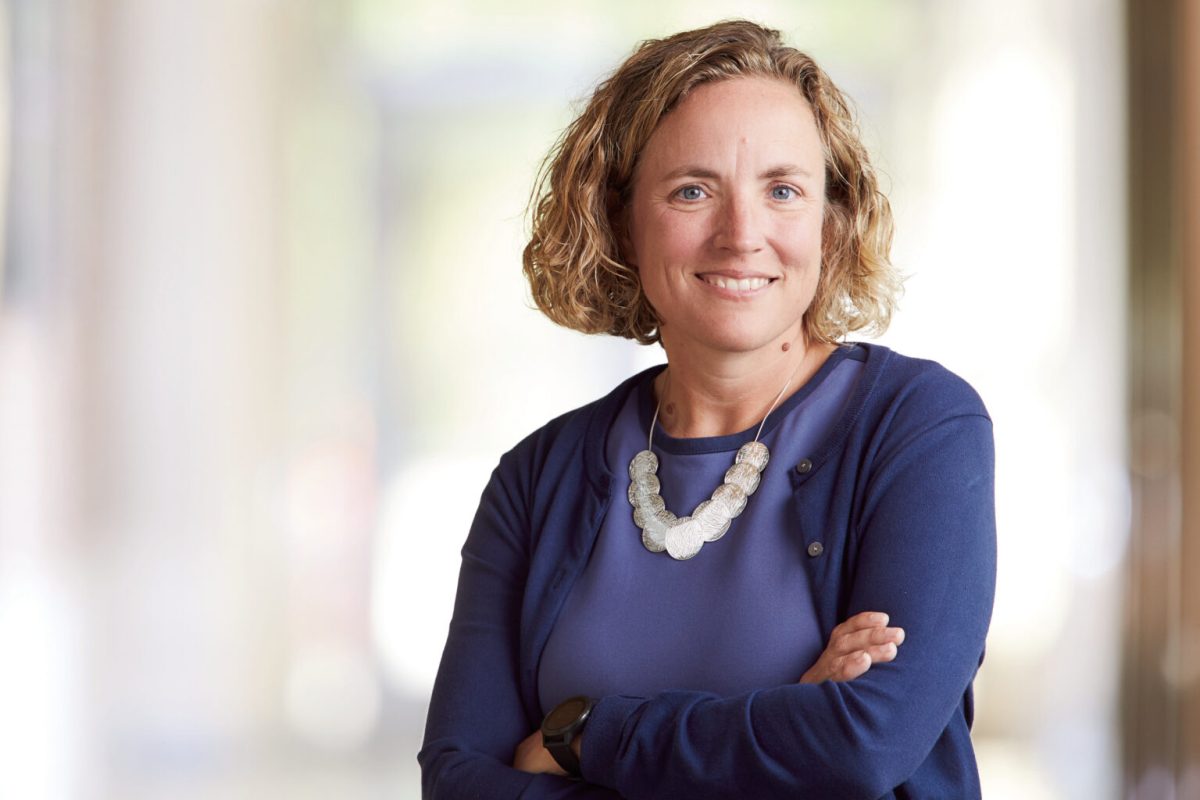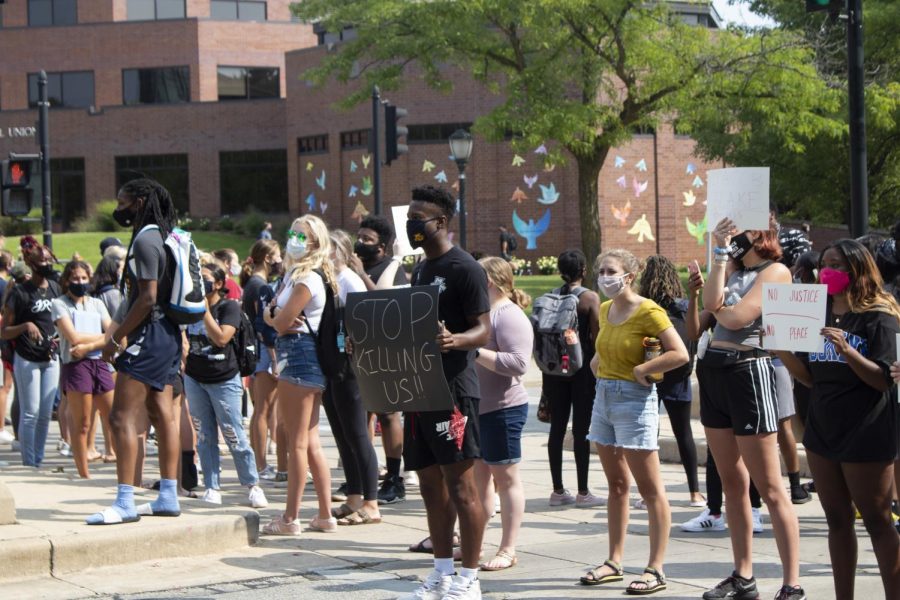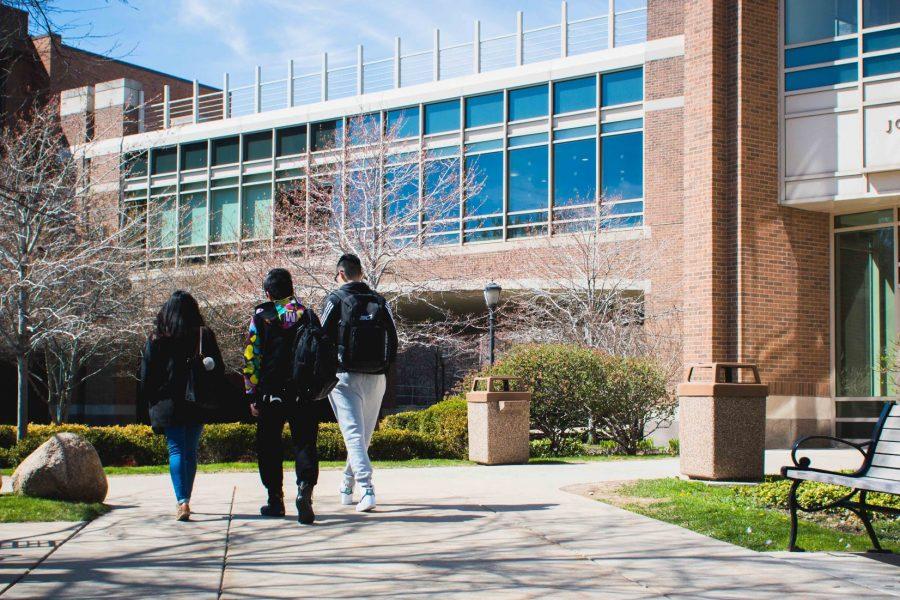The Marquette Wire had the opportunity to sit down with Provost Kimo Ah Yun for a 30-minute interview discussing the provost’s role, the strategic plan and the future of Marquette.
This interview has been edited for clarity.
What do you do in your role as provost?
What I try to explain is that this office, not my job directly, but people connected to this office are responsible for everything that’s directly connected to the student experience. So we recruit and admit students, we ensure that they have the right financial aid packages, we house students in the residence halls. When they get sick, we make sure that they have medical care on campus or beyond. I, through the Deans hire faculty, review programs to make sure we have the best available programs on campus, we work to create experiences where students get involved in high impact practices, study abroad, doing research with faculty. We open new programs or close old programs depending on whether or not students are interested in those programs, and then finally work to graduate them. Anything from retention to graduation to forming them and how they think giving the classes that all rises up through this office. Now, luckily, I have really good people who do that work. So there’s a vice president who takes care of Student Affairs, there’s a vice president who takes care of enrollment. So I just worked with them to ensure that all of the things that they are doing are aligning to our strategic plan and moving Marquette forward. And obviously, you know, one of the things that I know is that, you know, most of the revenue that Marquette gets is from student tuition dollars. And I feel there’s an obligation on my part to make decisions that help to best lower tuition for students. And when I’m engaging in fundraising, I always say my top priority is scholarships because I want to make a Marquette education as accessible as possible.
How does your role interact with other members of the executive leadership team?
Yeah, so there’s three of us who serve on the executive leadership team. We sit together on this team, and I think people think, there’s this magical and mysterious things happen, each of them are responsible for some part of the university and within our three offices, all of the university reports up to it. The President has his areas and Joel Pogodzinski has his. What we really do is have the largest university view of everything that’s happening. At that table, we’re having conversations about what are we doing across the university, but the most important thing I always stay focused on and the others as well, is Marquette’s mission. What decisions that either need to be made, or we need to make that are forward looking, that allows us to continue to fulfill the mission of the university, and I would say is, nothing is a higher priority to me. I walk in my job is to serve God. We serve God through transforming the lives of our students, and engaging in research that makes the world a better place. That is enough for me to come to work every day. That’s what we really focus on as the executive leadership team having to make very difficult choices along the way.
As we look towards, the new strategic plan, what are your priorities as we move into a new era of Marquette?
Yeah, regardless of the strategic plan, our mission statement remains the same. This is just a different way for us to ensure that we are achieving our mission. What I’m looking forward to is how do we provide the absolute best transformative student experience? Every day that’s what I will focus on. When we make decisions, I begin with the notion of students first. We should always ask the question, how does every decision impact the ability for students to be transformed? I will continue to do that. I think that’s what the new strategic plan does. It allows us to want our students to thrive. It focuses on allowing us to care for campus beyond students, our faculty and our staff, but also care about the future or the outlook of the university. How are we making the right choices to ensure Marquette exists for another 150 years and beyond? Lastly, focusing on the world and how we are going to care for the world. I think a lot of that has to do with the amazing research our faculty is doing to make the world a better place.
Faculty who are doing research that allows us to detect cancer earlier because of markers, faculty that are allowing individuals to regain mobility after they’ve had a traumatic spine injury, and allow them to leave to walk again, or to lead productive lives. Faculty who are doing research on how to ensure that remote areas have access to clean water, like all of those things, are the things that show why we have such an incredible impact on the world.
When you talk about the transformative student experience, what does that look like?
You know, students come to us in a in a particular place, they’re 17, maybe 18 years old. They’re trying to figure out who they are and who they will become, and at least at Marquette, how they will make a difference in the world. I think different people, different students desire different things. So for me, it’s there’s enough people who touch their lives here, that when they go, they leave with a sense of the world and who they are, there’s something much bigger than them, so that they’re going to go and make the world a better place. I would say as if we’re graduating, you know, a few 1000 people every year, who walk out with the intention of making the world a better place, that’s wonderful. When I think about that, I think about ensuring that they have mentors who have walked the path who are able to help them in their journey. It’s about having access to our spiritual and our religious side that those who really want to engage in that have it. It’s about teaching people about the types of things we’re responsible for doing outside of our job, and how do you find joy? What we’ll find is, you know, your job is important, but it’s only a small part of your life, I think about transforming is how do you give people a vision that says, your job was one thing that you do in life, but the degree to which you’re a good parent, a good sibling, a good friend, a good community member, like all of those things should be worked into our fabric. When we do that, well, those who stay in the Milwaukee area make Milwaukee better, and those who stay in the region make the region better. Those who go beyond make those beyond places better. That’s what it means for me to transform. It’s just people walk away with just a better sense of who they are, and how they’re going to do good.
You talk a lot about how your role always comes back to Marquette’s mission. How do you evaluate whether the work you’re doing is aligned with the mission? How does that work on a “bird’s eye view” level?
I think what changes is what happens to be the issue that I’m working to resolve. Now, three years, four years ago, it was COVID. That was, what do we do to protect the community to ensure that our students could get a continued quality education in light of everything happening around us? I think right now, we know that the federal government is changing FAFSA regulations. There are families right now who are trying to make decisions and who can’t make those decisions. I will say, here’s an example of how I worked towards the mission. Last week, we kind of looked at it and we said, look, we understand there’s a lot of frustration with families and not being able to make decisions because FAFSA is not in a place where we can accurately assess the degree to which they’re going to need additional merit. Well, one of the things I told our team is I want us to do something better and different than what other people are doing. So give me some options and they came back with a variety of options. Among those options, that I selected with Joel Pogodzinski and we approved with their support was taking the data that we have, using our modeling to best estimate what additional financial aid students would get, putting a package together and giving that information to them and telling them that when FAFSA ends up getting all worked out, your final word may be better or worse. Better means that the federal government provides more than we anticipate them giving, if that’s the case, great, we’re gonna get this and maybe more. But if we give you an offer, and the federal government’s offer comes below, we’re going to honor that. We’re going to hold you harmless, of this amount. We went out to parents and said this is our commitment that says we care about you, we understand that this is a stressful time, here’s what Marquette can do for you. Now we’re taking a risk there, but we think it’s a risk to lower the temperature and get students in a position where they feel good about making a decision. One of the things I was worried about is that they might make less desirable decisions for them personally, because they didn’t have all the information. So it was how do we get the most information out there? I would say as it changes year to year about what we’re doing now on the horizon, we’ve talked about the changing demographics, and fewer students going to college. Well, that’s something I’ve been thinking about since 2017. We know in 2026, this is when it begins, to see that happening in the system. If you just do a Google search on private high schools, you’ll see they’ve been pressured for the last handful of years, well, that’s part of this, people coming through the system, and then they’re gonna start hitting Marquette in the next year or two, which means, everything being equal, we’ll see lower, fewer students coming to Marquette. Now, obviously, we’re not resigned to that, I want to get as many students as possible. I would not like it to lower, but on the other hand, we know it’s gonna get more and more competitive just because the volume doesn’t exist. Then in another four years, you’re gonna see that with our masters and our PhD programs our law school programs and our dental program. I think it’s just working its way through the system. When you do the long range projections, it’s not going to improve anytime soon. Anybody can grab the birth rates and you would see there’s no sudden uptick which fine. I mean, that’s just the world we live in. It’s just a matter of what are the best decisions given the world we live in.
You talk a lot about the student experience being transformative. Has your experience at Marquette been transformative?
I came from a large public state institution. One of the reasons why I came to Marquette and I thought about my faith, and being able to bring that to campus. That has been something that has been absolutely transformative in my life. My wife and I and my family were actively involved in our church, but at a large public state institution when you step onto your campus, you really check your faith at the door. I’ve never had to check my faith here. Every one of our college meetings and leadership meetings, I also always open it up in prayer, and reflection and reading from the Bible, just to say as a Catholic, Jesuit institution, there are messages in the Bible that help us to become better people, which will make us better leaders, which will hopefully help us to make better students. At the end of the day it is hopefully the students that make that, but put us in the position of bringing the right things to work. That’s the first thing is just having that capacity. I think the second thing that has transformed me is I get the opportunity to travel all over the country in my capacity as Provost to be able to talk to donors, to see the commitment of our graduates after they leave Marquette is incredible. I’ve been in higher education for 28 years and I’ve never seen any other institution that has the same level of commitment of their graduates as we have as at? Marquette about how they want to give back to the existing student body, how their lives were transformed, and how they want to move forward. I was just earlier today with a couple of alums one that graduated from communication and one from arts & sciences. One of our alums is a vice president of communication for Lululemon and I’m talking to him and he’s back on campus today, even though he lives in LA, just to come and engage with our students in the College of Communication about what he does and how to make them better. And this isn’t just one, we have hundreds of our alums who mentor our students, that give back, which is just truly inspiring, and helps me to show up every day. Because the work that my team does, they’re not going to see what that work turns into. We’re talking 20, 30 years from now, those are the things that are engaging to me.
There’s been a lot of talk about all of the capital projects being built, what are your hopes for those?
Our space limitations only allowed us to have 150 nurses be admitted to Marquette. We had many nursing students who were qualified to be accepted, but our space limit only allowed us to accept 150. The new space allows us to bump to 250. We’re gonna have 400 more nurses on this campus that we wouldn’t have that we wouldn’t otherwise have. We have a high demand area that we can bring in really qualified students who are going to go out and make the world a better place. As a provost, if I can line those up, I will always do that. What I say is that if we chose not to do this, we would have fewer undergraduates on campus. That’s just true. I think that that’s one of the reasons why we look for opportunity. For that building it’ll pay for itself, it will produce additional revenue, that we could do other good things on campus, because the amount of time it will take to pay off that with the revenue will bring in. Then after that, it’s just more resources to be able to support the rest of the campus. That’s the first building.
Second building I can go to is the Lemonis Student Success Center. Now we received a $15 million gift that that renovation is almost fully fundraised for. Now, every time you get into a project you realize there are some things that maybe end up costing a little bit more, but not a lot more. The Lemonis Student Success Center is a space that we need to be able to improve our retention of our students. Every student we bring to campus, I want every one of them that we accept, and shows up and wants to be at Marquette to be able to graduate. But if you are a student, you don’t always know where the resources are. As a first generation college student, I didn’t know anything. When you don’t know where to go, then sometimes you drop through the cracks because you don’t know who to ask. The Success Center is going to say anything that you have that might impact your ability to stay enrolled at Marquette to earn a degree and get that transformative education, you’re going to be able to go there and have one place. That’s another space that I think is absolutely critical.
The third space is the wellness and rec space. Now depending on what you look at, but ? the wellness and the rec space, it’s something that was in the last strategic plan as a priority that the students voted on to raise their student fees, because that’s something they wanted. They did it at a time when they knew they weren’t even going to benefit from this, but we’re gonna raise the fees because we know this is something that is needed. We go back to what’s the value in this new building? Well, it’s going to provide us a one stop shop for your physical and mental health for you to be a better student. Secondly, it’s going to be a place where we can focus on the physical well being of our students. We also know that one of the things that we talked to families that a student shows up in September, the weather starts getting bad in November, it stays bad until May. So what do you do between November 1 and May 1? Some people go outside but there’s some pretty bitter cold days, they’re looking for a place to be able to work out to spend time with people to get the kind of their mental health care needs. For me, I see it as an investment into the future of our students, of which the origins came from our students that says this is something that we need to do.
So I do understand, I think it’s easy to look at and say, well, why invest in building? At some point, you have to invest in your buildings, and you want to invest in a space, that you have a mix of like brand new buildings, modern buildings, and you know, more traditional buildings because if you do nothing, then you’re gonna have all these expenses to build up. If you do everything, well, then you’re gonna have a cycle that all of them need to replace at the same time. It’s kind of like a puzzle where you’re putting all of the pieces together. What I would say is, the buildings do not take away from the campus, our buildings is one of the things that help attract. When I think about many of these buildings, it’s also improving the student learning experiences. So nursing is going to have state of the art equipment. Think about Johnston Hall, when I was dean there, I was fortunate to be able to help raise the money for the green room. That’s a space that’s the envy of people in Milwaukee and beyond. The newsroom, which is the Greiveldinger gift, was something that we received, but we didn’t know how we would execute that. My focus was, how do I create a space working with faculty, that’s going to make our students have this ability to have this wonderful space to learn in and… that’s just an example. We don’t walk into buildings and say, we just want a new building, what we say is, what would this building serve? And how would it make our community better? And when we see something strong enough to say we will be a better Marquette, then we move forward with it.
What’s the status on a potential biodiscovery building?
Yeah. So in the last master plan, we talked about buildings, and one of them was a biodiscovery, or a new science building. That’s another example of a new building, that would be good for the future Marquette. But like anything, the question is, how do we get there? So depending on the scope of it will depend on what it is. What’s important for any new space is we have to ask the question, how will the space allow us to do things differently, or to be better? Well, if we’re gonna do the same stuff and the old building versus new building, that’s not a reason for the new building. I put together a committee, who was working on a plan that said, what would we do to get biodiscovery off the ground? And in this plan, the question is, what would we do differently? How would we have teaching spaces that would be different? How would we have learning spaces that are different? How would our faculty be able to do research that allows them to collaborate across different areas? Then for all funding of buildings there are really three levers that we have first is fundraising, there’ll be some of our external people will contribute to fundraising. The second will be new revenue growth. For example, if we have a program, but we’ll call it degree x. And we’re like, we just don’t have the space or the technology to have program X. But if we built this building we could add that program X, and there would be another 100 students, well, that would be another layer. Then the last lever would be university funded dollars. Like anything what I would say is, I like the idea, but we have to identify, how do we intend to pay for this building?, like every building we’ve ever built on this campus? And how do we do that without jeopardizing the university itself? As soon as we have that upfront plan, and it makes sense, we’re gonna be off to the races. I always said this, as you think about those buckets, if there was a donor who came and said, here’s $200 million, go build a biodiscovery building, I’d have shovels in the ground next week. If they come to us and say, we have a donor who wants to give $100 million and here’s a new $50 million program, we can start, let’s put shovels in the ground. I think it’s getting to that place, we will get to there, it will likely be, biodiscovery or something like that. It’s all about timing. But when we get there, I will have that shovel in the ground. I go back to this is important for our faculty to do their research and for the students, but I can’t do it suddenly. I can’t raise tuition tremendously to pay for it, that’s unfair to our students. How do we be good stewards of the resources to make that happen? And when the timing happens, we’ll be there.
Another part of like, academic programming, obviously, faculty and staff. How do you see them playing into the overall mission of the university and how you interact with them?
They’re critical. They’re vital, you know, by the numbers, that we have the lowest faculty-to-student ratio in the history of Marquette that I can see. Like everything, I think we have to ask where our faculty and what expertise they have, but, ? y, I regularly talk about how phenomenal our faculty are. I think about when we do our jobs well we transform the students, I can’t transform the lives of the students, that’s our faculty. My wife’s a faculty member. She’s the one who’s on the front line of mentoring, counseling, directing, teaching, helping, it’s all critical.
And then, is there anything else you were hoping to talk about that we didn’t quite get to?
I would say is, Marquette is an incredible place. Marquette is in a position of strength. There, you know, many universities look at us as a model of things that we do. I think we should be proud of that. But our strength right now requires us to do the right things. If we do the right things, while we are strong, and we make good decisions or If we sit and wait until we don’t have an opportunity to move, then we are likely to make rash decisions that will not be good for the university. We’re talking about what are the actions that we take between now and 2031, our future is not mapped out for us, but we control our destiny. That’s why I’m really looking forward to the work that Ralph and Jill are doing (on the steering committee). I’m looking forward to continuing to engage with academic senate. Because when we get to the other side of this and we will, much of the resources that we’re using is to reinvest, so that I can wake up knowing that our staff are paid appropriately and our faculty are paid appropriately, and that we have the type of services that allow our students to be successful. That’s what I’m excited about. I think sometimes people get caught up in this notion because people are fearful and they’re worried, but I’m excited that our ability to reinvest into this community that we love and we think is incredible will only be benefited as a result of many things that they will do.

